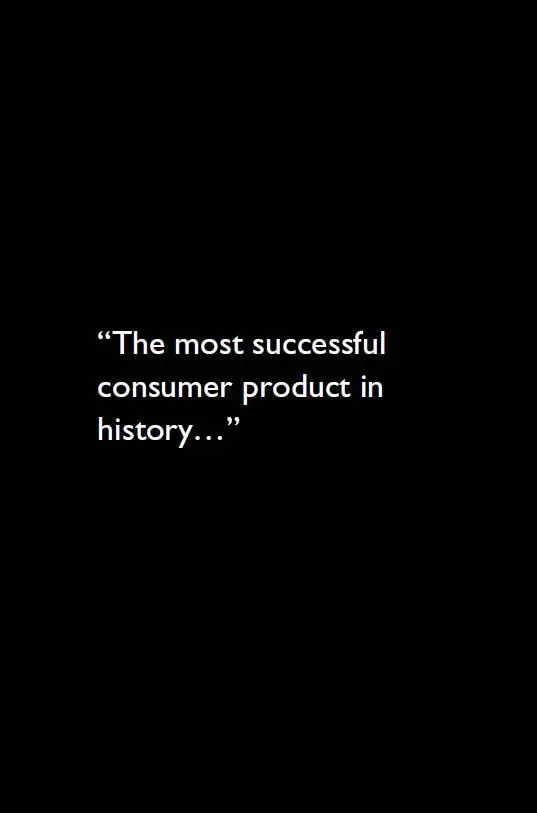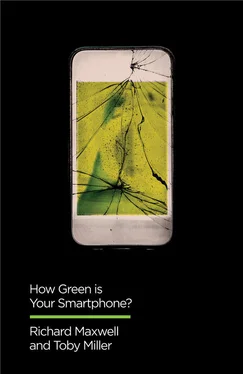
Because the diffusion of these devices has been more rapid than their innovation, sales finally began to diminish in 2018: there is a dwindling number of first-time customers left to corral. But even though improvements have become ever more marginal, the industry can count on 2.8 billion people replacing their phones every two years (“The Maturing,” 2019). Meanwhile, the consumer market is slowly becoming less significant than demand from military, medical, meat, and manufacturing segments of the economy (ABI Research for Visionaries/MWC 19 Barcelona, 2019).
For all that, digital utopians continue to fete the phone’s popularity, reach, and effects. According to Bell Labs, “more than 5 zettabytes of data … pass through the network every year. That is the equivalent of everyone in the world tweeting non-stop for more than 100 years.” 4For Edgar Morin, the instantaneity of phone communication means that our “world is made more and more whole” (1999). In similar vein, Ulrich Beck says the cellphone has altered “sociological categories of time, space, place, proximity and distance” as it “makes those who are absent present, always and everywhere” (2002: 31). It is said that one day the smartphone may even provide material clues to the way we lived:
The phone has much in common with the portable artifacts of a more traditional archaeology, like flint hand-axes or pottery vessels … an object scaled to fit the human world … shaped to fit the hand and fingers, and has action capabilities … orientated towards other parts of the body … (Edgeworth 2010: 143)
But there’s another side to this seeming cornucopia. The World Privacy Forum proposes that we inhabit a One-Way Mirror Society , where power accretes to corporations through the supposedly even-handed tool of interactivity (Dixon, 2010). Former true-believers at Wired magazine see the internet undone by the corporatization of knowledge and the sealed-set model of phone applications (Anderson and Wolff, 2010). Dan Schiller describes the displacement and deracination of modern life as a blend of individuation with mobility. He argues that political-economic arrangements mean that mobile telephony has emerged in a form befitting divided societies (2007).
And, while the gap in mobile-phone ownership between rich and poor has narrowed in the US, nearly 30 percent of adults with household incomes below $30,000 don’t own a smartphone, and over 40 percent of such households lack broadband, a desktop, or a laptop. About 26 percent of low-income Americans with smartphones but no home broadband depend on cellular services for network connectivity. That number has doubled since 2013 (Anderson and Kumar, 2019).
Globally, the smartphone gap between rich and poor regions is shrinking, though inequalities in access and service standards remain (Silver and Johnson, 2018). The International Telecommunications Union (ITU) reports that “[a]lmost the whole world population now lives within range of a mobile-cellular network signal,” and more than half are online (2018a, p. 2). The ITU notes (and promotes) the growing importance of mobile cellular telecommunications for economic growth in Africa, the Arab States, Asia, and Latin America (2018a, p. 4).
But by its own reckoning, there is immense variation within the Global South in smartphone ownership, access to mobile networks, and, perhaps most importantly, affordable, fast, and reliable connections (2018a, pp. 104–6 and 125–30; Alvarez, 2014; Bianchi, 2015). In addition, much of the Global South has a very significant gender gap in access to smartphones (Bhandari, 2019).
Ignoring these obdurate limitations, the ITU, the telecommunications industry, and electronics manufacturers insist that mobile cellular communication will inevitably and beneficially expand from the wealthy countries where they are headquartered. The industry’s hype has an imperious ring: we are heading inexorably toward the next stage of technological and human progress and pleasure. Mobile communication will be foundational.
In the face of such breathless predictions, we should keep in mind that the idea of technological progress has only been around since the nineteenth century, when it was deployed as propaganda “to deny the legitimacy and rationality” of organized opposition to industrial machinery (Noble, 1995). The Luddites, famous for sometimes destroying machines they feared would ruin their livelihoods and the quality of their craft, “did not believe in technological progress, nor could they have; the alien idea was invented after them, to try to prevent their recurrence” (Noble, 1995, p. 2).
They weren’t opposed to new technology per se , only to boosters’ obliviousness to its undemocratic designs and socially destructive deployment. We adhere to that critique in our examination of the smartphone as an emblem of technological progress. The world has been subject to the incessant promotion of smartphone innovations for over a decade. Such rhetoric ignores the central topics of this book: environmental harm, labor exploitation, and the connivance of industry with anti-science propaganda.
It’s ironic that The Economist used an adjective generally applied to the “terror” of running out of petroleum – “peak oil” – to describe super-saturation of the world cellphone market. For both industries have played malevolent roles in our planetary crisis. And both relate to the concept “green” in our title. “Green” can signify displeasure, even disgust. For example, “he turned green” or “it’s indefensible to have green lawns in LA.” But the meaning of the term is more complex than that. It is simultaneously serene, beneficial, disturbing, corrupted, radical, and conservative: green consumption, green certification, new (green) deal, and greenwashing.
In the late 1960s and early 1970s, the word “pollution” was in vogue to explain environmental hazards. Both a ubiquitous and a local sign, it seemed to be everywhere, yet isolable. The problems it described occurred when particular waterways, neighborhoods, or fields suffered negative externalities from mining, farming, and manufacturing. The issue was how to restore these places to their prior state: pristine, unspoiled, enduring. Pollution was about corporate malfeasance, governmental neglect, and public ignorance, and how to remedy their malign impact. It could be cleaned up if governments compelled companies to do so – and would soon be over, once those involved understood the problem.
But when greenhouse gases, environmental racism, global warming, occupational health, and environmental imperialism appeared on the agenda, pollution reached beyond national boundaries and became ontological, threatening the very Earth that gives and sustains life, and doing so in demographically unequal ways.
A word was found to describe the values and forms of life that encompassed a planetary consciousness to counter this disaster, as per the utopias of world government that had animated transnational imaginations for decades: “green” emerged to displace the more negative and limited term “pollution,” signifying both new possibilities and a greater and more global sense of urgency. Its purview expanded from waterways and work places to populations and the planet.
This beguilingly simple syntagm, “green,” was quickly transformed into a complex polysemic mélange . Today, it can refer to local, devolved, non-corporate empowerment, or international consciousness and institutional action. The term is invoked by both conservatives, who emphasize maintaining the world for future generations, and radicals, who stress anti-capitalist, post-colonial, feminist perspectives. “Green” may highlight the disadvantages of technology, as a primary cause of environmental difficulties, or hail such innovations as future saviors, via devices and processes yet to be invented that will alleviate global warming. It can favor state and international regulation, or be skeptical of public policy. It may encourage individual consumer responsibility, or question localism by contrast with collective action. It can reflect left–right axes of politics, or argue that they should be transcended, because neither statism nor individualism can fix the dangers we confront.
Читать дальше













